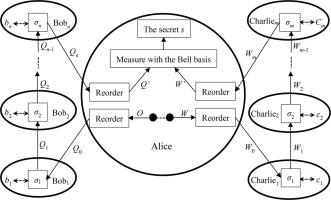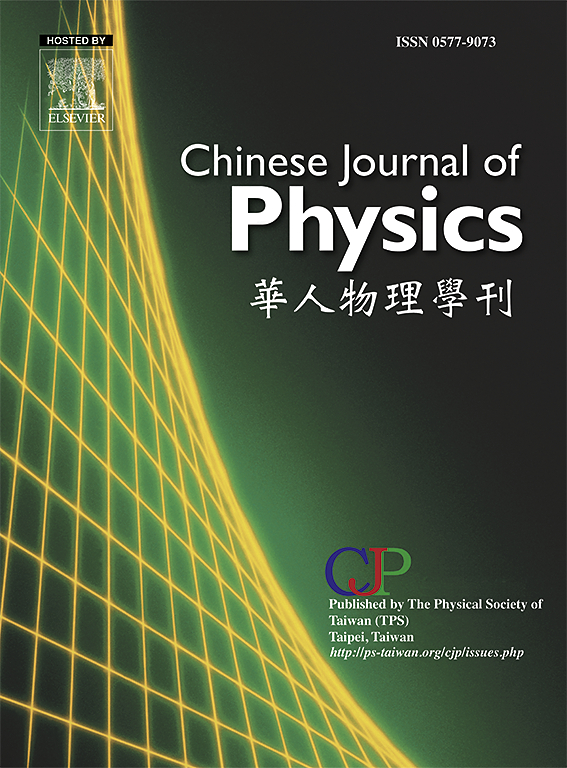Efficient Multi-party Quantum Secret-Sharing Protocol
IF 4.6
2区 物理与天体物理
Q1 PHYSICS, MULTIDISCIPLINARY
引用次数: 0
Abstract
Context
Quantum secret sharing allows one secret dealer to divide his/her secret among different participants. Only when all the participants pool their secret pieces together can the secret be reconstructed. Quantum secret-sharing protocol can provide high security for users who need to share some secret information among some partners. It is also a useful tool in many applications such as secure operations of joint sharing of quantum money, sharing ancilla states, and distributed quantum computation.
Objective
We propose a novel multi-party quantum secret-sharing protocol (MPQSSP).
Methods
In our protocol, the dealer mixes the particle sequence of the Bell states and sends the sequence to the participants. The participants encode their secret pieces into Pauli operators, which are applied to the received particle sequence. After annularly transmitting and operating the particle sequence, the participants return the particle sequence to the dealer, who can share a secret with the partners by measuring the returned sequence with the Bell basis.
Results
The proposed MPQSSP has the merits as follows. First, its qubit efficiency can be 100% when the sample bits of the secret and the corresponding sample qubits are ignored (In our protocol when the qubit efficiency is computed, the sample bits and the corresponding Bell states used to check eavesdropping are ignored). Second, it can protect participants' privacy and interests, since the dealer cannot derive the secret piece of any participant although he/she masters the secret. Third, the participants need not perform many quantum operations and measurements to check the eavesdropping, which helps improve the efficiency of the protocol. Fourth, compared with most of the similar MPQSSPs, the quantum resources of the proposed one are relatively easier to prepare. At last, the proposed protocol has the security against various eavesdropping attacks.
Conclusion
The merits above show that Our MPQSSP is relatively more practical and efficient than similar ones.

高效的多方量子秘密共享协议
上下文量子秘密共享允许一个秘密交易者将他/她的秘密分给不同的参与者。只有当所有参与者将他们的秘密碎片集中在一起时,才能重建秘密。量子秘密共享协议可以为需要在一些合作伙伴之间共享一些秘密信息的用户提供高安全性。我们提出了一种新颖的多方量子秘密共享协议(MPQSSP)。在我们的协议中,交易者混合贝尔态的粒子序列,并将序列发送给参与者。参与者将自己的秘密片段编码成保利算子,应用于接收到的粒子序列。在环形传输和操作粒子序列后,参与者将粒子序列返回给交易者,交易者可以通过用贝尔基测量返回的序列来与合作伙伴共享秘密。首先,当忽略秘密的采样比特和相应的采样比特时,其量子比特效率可达 100%(在我们的协议中,计算量子比特效率时,用于检查窃听的采样比特和相应的贝尔态被忽略)。其次,它可以保护参与者的隐私和利益,因为庄家虽然掌握了任何参与者的秘密,但却无法推导出他/她的秘密片段。第三,参与者不需要执行很多量子操作和测量来检查窃听,这有助于提高协议的效率。第四,与大多数类似的 MPQSSP 相比,拟议协议的量子资源相对更容易准备。最后,本文提出的协议具有抵御各种窃听攻击的安全性。
本文章由计算机程序翻译,如有差异,请以英文原文为准。
求助全文
约1分钟内获得全文
求助全文
来源期刊

Chinese Journal of Physics
物理-物理:综合
CiteScore
8.50
自引率
10.00%
发文量
361
审稿时长
44 days
期刊介绍:
The Chinese Journal of Physics publishes important advances in various branches in physics, including statistical and biophysical physics, condensed matter physics, atomic/molecular physics, optics, particle physics and nuclear physics.
The editors welcome manuscripts on:
-General Physics: Statistical and Quantum Mechanics, etc.-
Gravitation and Astrophysics-
Elementary Particles and Fields-
Nuclear Physics-
Atomic, Molecular, and Optical Physics-
Quantum Information and Quantum Computation-
Fluid Dynamics, Nonlinear Dynamics, Chaos, and Complex Networks-
Plasma and Beam Physics-
Condensed Matter: Structure, etc.-
Condensed Matter: Electronic Properties, etc.-
Polymer, Soft Matter, Biological, and Interdisciplinary Physics.
CJP publishes regular research papers, feature articles and review papers.
 求助内容:
求助内容: 应助结果提醒方式:
应助结果提醒方式:


